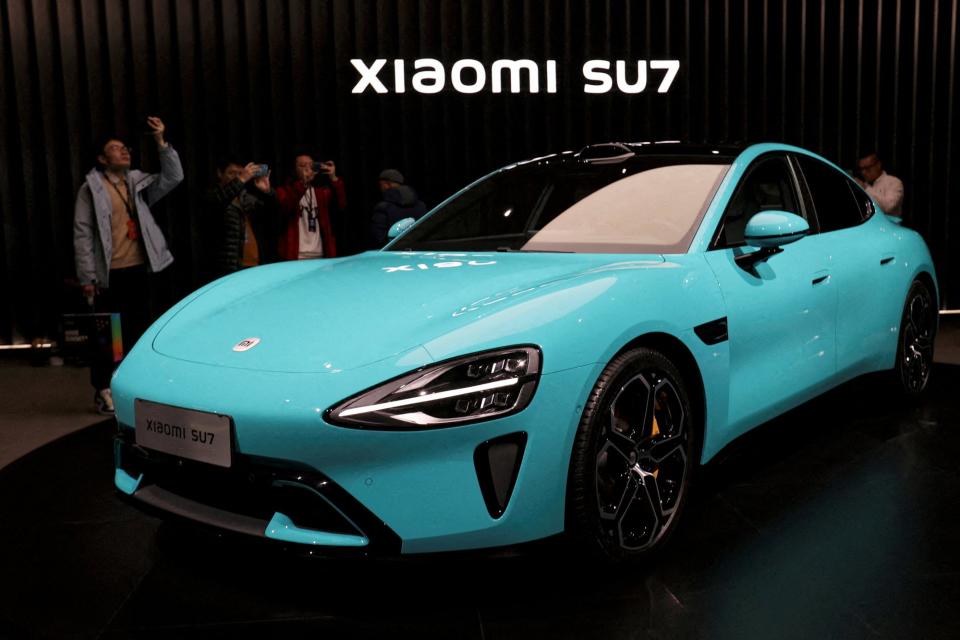Xiaomi posts better-than-expected quarterly sales on growing smartphone shipments, as EV target remains on track
Chinese smartphone and electric vehicle (EV) maker Xiaomi grew its first-quarter revenue by a better-than-expected 27 per cent year on year, as handset shipments recovered globally.
Sales reached 75.5 billion yuan (US$10.5 billion) during the quarter ended March 31, beating the consensus analysts' forecast of 73.5 billion compiled by Bloomberg. The world's best-selling Chinese smartphone brand saw handset sales, which made up nearly 62 per cent of its total revenue, jump 33 per cent to 46.5 billion yuan.
Total profits dropped slightly by 1 per cent to 4.1 billion yuan.
Do you have questions about the biggest topics and trends from around the world? Get the answers with SCMP Knowledge, our new platform of curated content with explainers, FAQs, analyses and infographics brought to you by our award-winning team.
Xiaomi's shares closed at HK$18.94 on Thursday ahead of the earnings announcement, down more than 2.5 per cent.

Xiaomi's first electric vehicle, the SU7. Photo: Reuters alt=Xiaomi's first electric vehicle, the SU7. Photo: Reuters>
The Beijing-based company, which in March debuted its first sedan, the SU7, said it received orders for 88,063 vehicles as of the end of April, and delivered 10,000 cars as of May 15. During the first quarter, Xiaomi spent 2.3 billion yuan on its EV business and other new initiatives, it said.
The company is on track to reach its goal of delivering 100,000 SU7 cars this year, as it accelerates moves to build 200 EV stores in 50 cities across China by the end of 2024, company president Lu Weibing said on a post-earnings conference call.
Xiaomi also plans to expand its smart-driving unit by adding 500 engineers to the current team of 1,000 engineers this year, having budgeted 1.5 billion yuan for the project, according to Lu.
The company's EV foray is widely expected to heat up a bruising price war in China, which has put pressure on the earnings of industry players. Li Auto, Tesla's closest rival in the premium EV segment, earlier this week posted a 37 per cent drop in net income for the first quarter.
As part of its intensified push into the EV industry, Xiaomi recently hired Wang Naiyan, former technology chief at Chinese self-driving truck company TuSimple, which voluntarily delisted from the Nasdaq in January.
Wang confirmed the move when reached by the Post on Thursday, after Chinese media outlets reported on the news earlier. He will work directly under Xiaomi's autonomous-driving head, Ye Hangjun.
In the first quarter, Xiaomi maintained its spot as the world's third-largest smartphone vendor with a 14 per cent market share, after its global shipments grew nearly 34 per cent to top 40 million units, according to data from research firm IDC.
In mainland China, however, the company fell out of the top five in the same quarter, after Huawei Technologies staged a strong comeback with its 5G-capable Mate 60 series smartphones, IDC figures showed.
Smartphone shipments in the country rose 6.5 per cent during the quarter.
This article originally appeared in the South China Morning Post (SCMP), the most authoritative voice reporting on China and Asia for more than a century. For more SCMP stories, please explore the SCMP app or visit the SCMP's Facebook and Twitter pages. Copyright © 2024 South China Morning Post Publishers Ltd. All rights reserved.
Copyright (c) 2024. South China Morning Post Publishers Ltd. All rights reserved.

 Yahoo Finance
Yahoo Finance 